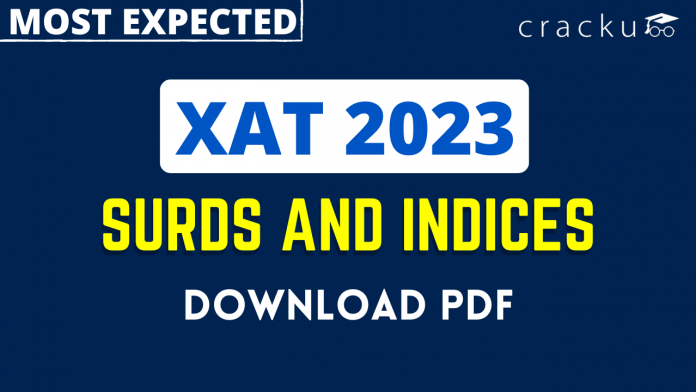XAT Surds and Indices Questions PDF [Important]
Download Surds and Indices Questions for XAT PDF – XAT Inequalities questions pdf by Cracku. Practice XAT solved Surds and Indices Questions paper tests, and these are the practice question to have a firm grasp on the Surds and Indices topic in the XAT exam. Top 20 very Important Surds and Indices Questions for XAT based on asked questions in previous exam papers. The XAT question papers contain actual questions asked with answers and solutions.
Download Surds and Indices Questions for XAT
Enroll to XAT 2023 Crash Course
Question 1: If x = 1 + $\surd{2}$+ $\surd{3}$, then the value of 2x^{4}- 8x^{3}- 5x^{2} + 26x – 28 is
a) 2$\surd{2}$
b) 3$\surd{3}$
c) 5$\surd{5}$
d) 6 $\surd{6}$
1) Answer (D)
Solution:
x = 1 + $\surd{2}$+ $\surd{3}$
=> $ (x-1)^2 = ( \surd{2}+ \surd{3})^{2} $
=> $ x^2 + 1 -2x = 5 + 2\surd{6} $
=> $ x^2-2x =4 + 2\surd{6} $ ———– (1)
Squaring on both sides
=> $ (x^2-2x)^2 = x^4 + 4x^2 – 4x^3 = 40 + 16\surd{6} $ —— (2)
Now,
$2x^{4}- 8x^{3}- 5x^{2} + 26x – 28 = 2(x^{4}-4x^{3})- 5x^{2} + 26x – 28 $ —- (3)
Substituting values in (1) & (2) in equation (3), we get value as $ 6 \surd {6} $
Question 2: if x+ $\frac{1}{x}$=$\surd{3}$ then the value of $x^{18}+x^{12}+x^{6}+1$
a) 0
b) 1
c) 2
d) 3
2) Answer (A)
Solution:
Given that x+ $\frac{1}{x}$=$\surd{3}$
Squaring on both sides, we get
$(x+ \frac{1}{x})^{3}=(\surd{3})^{3}$
=> $x^{3}+\frac{1}{x^3}+3\surd{3}=3\surd{3}$
=> $x^{3}+\frac{1}{x^3} = 0 $
=> $x^{3}= – \frac{1}{x^3} $
=> $x^{6}= -1 $
Squaring on both sides
=> $x^{12}= 1 $
$ (x^{6})^{3} = (-1)^{3} = -1 $
Therefore,
$x^{18}+x^{12}+x^{6}+1$ = $ -1 + 1 -1 + 1 = 0 $
Question 3: If $P = 2^{29}\times3^{21} \times 5^8,Q = 2^{27} \times 3^{21} \times 5^8, R = 2^{26} \times 3^{22} \times 5^8$ and $S = 2^{25} \times 3^{22} \times 5^9$, then which of the following is TRUE?
a) $P > S > R > Q$
b) $S > P > R > Q$
c) $P > R > S > Q$
d) $S > P > Q > R$
3) Answer (A)
Solution:
Let say, $M=2^{25}\times3^{21}\times5^8.$
So, by rearranging above equation ,we can say that :
$P=2^4\times M=16M.$
$Q=2^2\times M=4M.$
$R=2\times3\times M=6M.$
$S=3\times5\times M=15M.$
So, $P > S > R > Q$.
A is correct choice.
Question 4: Which of the following statement(s) is/are TRUE?
I. $\surd1+\surd2+\surd3+\surd4+\surd5+\surd6>10$
II. $\surd(10)+\surd(12)+\surd(14)>3\surd(12)$
a) only I
b) only II
c) Niether I nor II
d) Both I and II
4) Answer (A)
Solution:
$\sqrt{1}+\sqrt{2}+\sqrt{3}+\sqrt{4}+\sqrt{\ 5}+\sqrt{6}=10.83.$
it means that (I) is correct.
And, $\sqrt{10}+\sqrt{12}+\sqrt{14}=10.36.$
but, $3\sqrt{12}=10.39.$
So, (II) is not correct .
So, A is correct choice.
Question 5: If $N = (12345)^2 + 12345 +12346$, then what is the value of $\surd N$ ?
a) 12346
b) 12345
c) 12344
d) 12347
5) Answer (A)
Solution:
$N=(12345)^2+12345+12346=12345^2+12345+12345+1=12345^2+2\times12345\times1+1^2$
So, $N=(12345+1)^2$
So, $\sqrt{N}=12346\ .$
A is correct choice.
Question 6: $\alpha$ and $\beta$ are the roots of quadratic equation. If $\alpha + \beta = 8$ and $\alpha – \beta = 2\surd5$, then which of the following equation will have roots $\alpha^4$ and $\beta^4$?
a) $x^2 – 1522x + 14641 = 0$
b) $x^2 + 1921x + 14641 = 0$
c) $x^2- 1764x + 14641 = 0$
d) $x^2+ 2520x + 14641 = 0$
6) Answer (A)
Solution:
According to question :
$2\alpha\ =8+\sqrt{5}\ \ or\ \ \ \alpha=4+\sqrt{5}\ .$
And, $2\beta=8-\sqrt{5}\ \ or\ \ \ \beta=4-\sqrt{5}\ .$
So, $\alpha^2=\left(4+\sqrt{5}\right)^2=\left(21+8\sqrt{5}\right).$
And, $\beta^2=\left(4-\sqrt{5}\right)^2=\left(21-8\sqrt{5}\right).$
Again ,
$\alpha^4=\left(\alpha^2\right)^2=\left(21+8\sqrt{5}\right)^2=\left(761+336\sqrt{5}\right).$
$\beta^4=\left(\beta^2\right)^2=\left(21-8\sqrt{5}\right)^2=\left(761-336\sqrt{5}\right).$
So, new equation whose roots are above two :
$x^2-\left(\alpha^4+\beta^4\right)x+\left(\alpha^4\beta^4\right)=0\ .$
or, $x^2-\left(761+336\sqrt{5}+761-336\sqrt{5}\right)x+\left(761+336\sqrt{5}\right)\left(761-336\sqrt{5}\right)=0\ .$
or, $x^2-1522x+14641=0\ .$
A is correct choice.
Question 7: Which of the following statement(s) is/are TRUE?
I. $\surd5 + \surd5 > \surd7 + \surd3$
II. $\surd6 + \surd7 > \surd8 + \surd5$
III. $\surd3 + \surd9 > \surd6 + \surd6$
a) Only I
b) Only I and II
c) Only II and III
d) Only I and III
7) Answer (B)
Solution:
Statement I :
$\sqrt{5}+\sqrt{5}=4.47\ .$ and $\sqrt{7}+\sqrt{3}=4.37\ .$
So, Statement I is correct .
Statement II :
$\sqrt{6}+\sqrt{7}=5.09\ \ and\ \ \sqrt{8}+\sqrt{5}=5.06\ .$
II is also correct .
Statement III:
$\sqrt{3}+\sqrt{9}=4.73\ \ and\ \ \sqrt{6}+\sqrt{6}=4.89\ .$
So, III is not correct .
B is correct choice.
Question 8: Which of the following statement(s) is/are TRUE?
I. $\surd(64) + \surd(0.0064) + \surd(0.81) + \surd(0.0081) = 9.07$
II. $\surd(0.010201) + \surd(98.01) + \surd(0.25) = 11.51$
a) Only I
b) Only II
c) Both I and II
d) Neither I nor II
8) Answer (A)
Solution:
$\surd(64)+\surd(0.0064)+\surd(0.81)+\surd(0.0081)=8+0.08+0.9+0.09=9.07\ .$
So, I is correct .
$\surd(0.010201)+\surd(98.01)+\surd(0.25)=10.501\ .$
II is not correct .
A is correct choice.
Question 9: Which of the following statement(s) is/are true?
$I. (65)^{\frac{1}{6}} > (17)^{\frac{1}{4}} > (12)^{\frac{1}{3}}$
$II. (17)^{\frac{1}{4}} > (65)^{\frac{1}{6}} > (12)^{\frac{1}{3}}$
$III. (12)^{\frac{1}{3}} > (17)^{\frac{1}{4}} > (65)^{\frac{1}{6}}$
a) Only I
b) Only III
c) Only II
d) None of these
9) Answer (B)
Solution:
$(65)^{\frac{1}{6}} , (17)^{\frac{1}{4}} , (12)^{\frac{1}{3}}$
$(12)^{\frac{1}{3}}$=$(144)^{\frac{1}{6}}$
So $(144)^{\frac{1}{6}}$>$(65)^{\frac{1}{6}} $
$(65)^{\frac{1}{6}} $=$(4225)^{\frac{1}{12}} $
$(17)^{\frac{1}{4}}$=$(4913)^{\frac{1}{12}} $
Therefore $(12)^{\frac{1}{3}}$ > $(17)^{\frac{1}{4}}$ >$(65)^{\frac{1}{6}} $
Question 10: Which of the following is TRUE?
$I. \sqrt[3]{11} > \sqrt{7} > \sqrt[4]{45}$
$II. \sqrt{7} > \sqrt[3]{11} > \sqrt[4]{45}$
$III. \sqrt{7} > \sqrt[4]{45} > \sqrt[3]{11}$
$IV. \sqrt[4]{45} > \sqrt{7} > \sqrt[3]{11}$
a) only $I$
b) only $II$
c) only $III$
d) only $IV$
10) Answer (C)
Solution:
$\sqrt[3]{11} , \sqrt{7}, \sqrt[4]{45}$
Here $\sqrt{7}=\sqrt[4]{49}$
$sqrt[4]{45}<\sqrt[4]{49}$
Now $sqrt[4]{45}>$\sqrt[3]{11} since 3rd power of 45 will be greater than 4th power of 11 i.e 14631
an so $\sqrt{7} > \sqrt[4]{45} > \sqrt[3]{11}$
Question 11: Which of the following is TRUE?
$I. \frac{1}{\sqrt[3]{12}} > \frac{1}{\sqrt[4]{29}} > \frac{1}{\sqrt{5}}$
$II. \frac{1}{\sqrt[4]{29}} > \frac{1}{\sqrt[3]{12}} > \frac{1}{\sqrt{5}}$
$III. \frac{1}{\sqrt{5}} > \frac{1}{\sqrt[3]{12}} > \frac{1}{\sqrt[4]{29}}$
$IV. \frac{1}{\sqrt{5}} > \frac{1}{\sqrt[4]{29}} > \frac{1}{\sqrt[3]{12}}$
a) only $I$
b) only $II$
c) only $III$
d) only $IV$
11) Answer (C)
Solution:
$\frac{1}{\sqrt[3]{12}} , \frac{1}{\sqrt[4]{29}} , \frac{1}{\sqrt{5}}$
Here if we write $\frac{1}{\sqrt{5}}$ in terms of fourth root we have $\frac{1}{\sqrt[4]{25}}$
So $\frac{1}{\sqrt[4]{29}} > \frac{1}{\sqrt[4]{5}}$
$\sqrt[3]{12}$=$\sqrt[12]{144*144}$
$\frac{1}{\sqrt[4]{29}}$=$\frac{1}{\sqrt[12]{29*29*29}}$
Therefore ${\sqrt[4]{29}}$>$\sqrt[3]{12}$
As these are given in the denominators order will be reversed.
$\frac{1}{\sqrt{5}} > \frac{1}{\sqrt[3]{12}} > \frac{1}{\sqrt[4]{29}}$
Question 12: Determine the value of ‘a’ which satisfies the equation $9^{\sqrt{a}}+40^{\sqrt{a}}=41^{\sqrt{a}}$
a) 1
b) 2
c) 3
d) 4
12) Answer (D)
Solution:
Expression : $9^{\sqrt{a}}+40^{\sqrt{a}}=41^{\sqrt{a}}$
Since equation consists of natural numbers, then ‘a’ must be an integer. Thus, substituting ‘a’ by perfect square numbers :
Put $a=1$
=> $9^{\sqrt{1}}+40^{\sqrt{1}}=41^{\sqrt{1}}$
L.H.S. = $9+40=49\neq$ R.H.S.
Now, putting $a=4$
=> $9^{\sqrt{4}}+40^{\sqrt{4}}=41^{\sqrt{4}}$
L.H.S. = $9^2+40^2=81+1600=1681$
R.H.S. = $41^2=1681$
Thus, $a=4$
=> Ans – (D)
Question 13: Calculate the value of $\frac{\sqrt{3}}{(3+\sqrt{3})}$ if $\sqrt{3}=1.7320$
a) 0.366
b) 0.566
c) 0.356
d) 0.346
13) Answer (A)
Solution:
Expression : $\frac{\sqrt{3}}{(3+\sqrt{3})}$ if $\sqrt{3}=1.7320$
Rationalizing the denominator :
= $\frac{\sqrt{3}}{(3+\sqrt{3})}\times\frac{(3-\sqrt3)}{(3-\sqrt3)}$
= $\frac{\sqrt3(3-\sqrt3)}{(3)^2-(\sqrt3)^2}=\frac{3\sqrt3-3}{9-3}$
= $\frac{\sqrt3-1}{2}=\frac{(1.7320-1)}{2}$
= $\frac{0.7320}{2}=0.366$
=> Ans – (A)
Question 14: If $4x=\sqrt{5}+2$, then $x-\frac{1}{16x}$ ?
a) 1
b) -1
c) 4
d) 2√5
14) Answer (A)
Solution:
Given : $4x=\sqrt{5}+2$
=> $x=\frac{\sqrt{5}+2}{4}$
To find : $x-\frac{1}{16x}$
= $\frac{\sqrt{5}+2}{4} – \frac{4}{16(\sqrt{5}+2)}$
= $\frac{\sqrt{5}+2}{4}-\frac{1}{4(\sqrt{5}+2)}$
= $\frac{(\sqrt{5}+2)^2-1}{4(\sqrt{5}+2)}$
= $\frac{5+4+4\sqrt{5}-1}{4(\sqrt{5}+2)}$
= $\frac{8+4\sqrt{5}}{8+4\sqrt{5}}=1$
=> Ans – (A)
Question 15: The value of $(1-\sqrt{2})+(\sqrt{2}-\sqrt{3})+(\sqrt{3}-\sqrt{4})+…..+(\sqrt{15}-\sqrt{16})$ is
a) 0
b) 1
c) -3
d) 4
15) Answer (C)
Solution:
Expression : $(1-\sqrt{2})+(\sqrt{2}-\sqrt{3})+(\sqrt{3}-\sqrt{4})+…..+(\sqrt{15}-\sqrt{16})$
= $1 + (-\sqrt{2}+\sqrt{2})+(-\sqrt{3}+\sqrt{3})+…..+(-\sqrt{14}+\sqrt{14})+(-\sqrt{15}+\sqrt{15})-\sqrt{16}$
= $1-\sqrt{16}=1-4=-3$
=> Ans – (C)
Question 16: The value of $\sqrt{9-2\sqrt{16}+3\sqrt[3]{512}}$ is
a) 6
b) 5
c) 2√8
d) 3√6
16) Answer (B)
Solution:
Expression : $\sqrt{9-2\sqrt{16}+3\sqrt[3]{512}}$
= $\sqrt{9-(2 \times 4)+(3 \times 8)}$
= $\sqrt{9-8+24}=\sqrt{25}$
= $5$
=> Ans – (B)
Question 17: If $\sqrt{1+\frac{x}{144}}=\frac{13}{12}$ then x equals to
a) 1
b) 13
c) 27
d) 25
17) Answer (D)
Solution:
Expression : $\sqrt{1+\frac{x}{144}}=\frac{13}{12}$
Squaring both sides,
=> $(1+\frac{x}{144})=(\frac{13}{12})^2$
=> $\frac{144+x}{144}=\frac{169}{144}$
=> $144+x=169$
=> $x=169-144=25$
=> Ans – (D)
Question 18: If $x=\sqrt{a}+\frac{1}{\sqrt{a}},y=\sqrt{a}-\frac{1}{\sqrt{a}}, (a>o)$ the the value of $x^{4}+y^4-2x^2y^2$ is
a) 16
b) 20
c) 10
d) 5
18) Answer (A)
Solution:
Given : $x=\sqrt{a}+\frac{1}{\sqrt{a}}$
Squaring both sides
=> $(x)^2=(\sqrt{a}+\frac{1}{\sqrt{a}})^2$
=> $x^2=(\sqrt{a})^2+(\frac{1}{\sqrt{a}})^2+2.\sqrt{a}.\frac{1}{\sqrt{a}}$
=> $x^2=a+\frac{1}{a}+2$ ————-(i)
Similarly, $y^2=a+\frac{1}{a}-2$ ———(ii)
To find : $x^{4}+y^4-2x^2y^2$
= $(x^2-y^2)^2$
Substituting values from equations (i) and (ii), we get :
= $[(a+\frac{1}{a}+2)-(a+\frac{1}{a}-2)]^2$
= $(2+2)^2=(4)^2=16$
=> Ans – (A)
Question 19: If $x=\sqrt[3]{28},y=\sqrt[3]{27}$, then the value of $x+y-\frac{1}{x^2+xy+y^2}$ is
a) 8
b) 7
c) 6
d) 5
19) Answer (C)
Solution:
Given : $x=\sqrt[3]{28},y=\sqrt[3]{27}$
=> $x^3=28$ and $y^ 3=27$ ———-(i)
=> $y=3$ ———–(ii)
To find : $x+y-\frac{1}{x^2+xy+y^2}$
= $(x+y)-(\frac{(x-y)}{(x-y)(x^2+xy+y^2)})$ [Multiply and divide by $(x-y)$]
Using, $(x-y)(x^2+xy+y^2)=(x^3-y^3)$
= $(x+y)-(\frac{x-y}{x^3-y^3})$
= $(x+y)-(\frac{x-y}{28-27})$ [Using (i)]
= $(x+y)-(x-y)=2y$
= $2 \times 3=6$ [Using (ii)]
=> Ans – (C)
Question 20: $\frac{1}{\sqrt{a}}-\frac{1}{\sqrt{b}}=0$, then the value of $\frac{1}{a}+\frac{1}{b}$ is
a) $\frac{1}{\sqrt{ab}}$
b) ${\sqrt{ab}}$
c) $\frac{2}{\sqrt{ab}}$
d) $\frac{1}{2\sqrt{ab}}$
20) Answer (C)
Solution:
Given : $\frac{1}{\sqrt{a}}-\frac{1}{\sqrt{b}}=0$
Squaring both sides, we get :
=> $(\frac{1}{\sqrt{a}}-\frac{1}{\sqrt{b}})^2=0$
=> $(\frac{1}{\sqrt{a}})^2+(\frac{1}{\sqrt{b}})^2-2(\frac{1}{\sqrt{a}})(\frac{1}{\sqrt{b}})=0$
=> $\frac{1}{a}+\frac{1}{b}-\frac{2}{\sqrt{a}\sqrt{b}}=0$
=> $\frac{1}{a}+\frac{1}{b}=\frac{2}{\sqrt{ab}}$
=> Ans – (C)





